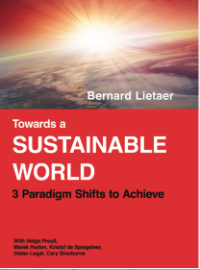Towards a sustainable world: 3 Paradigm shifts
Bernard Lietaer, Helga Preuss, Marek Hudon, Kristof de Spiegeleer, Dieter Legat, Cary Sherburne, Delta Institute - Dieter Legat E.U, Vienna/Wien, Austria, novembre 2019

A new book by Bernard Lietaer shows the way to a sustainable world and calls for concrete measures from individuals and leaders.
Lietaer calls for a new perspective and three paradigm shifts essential for survival. With unsuitable means we half-heartedly try to repair the complicated clockwork of our world. This gets us nowhere. It won’t get us out of the crisis. The time has come to choose a completely different perspective and to lead ourselves and our world through “three paradigm shifts”.
This is what Bernard Lietaer demands in this book, which he dictated on his deathbed.
First: Recognize and adhereto the law of sustainability.
Lietaer shows that in our world we are dealing with “living systems” that are linked in many ways. With forests, our money, our society, and .. and .. and. Our well-being depends on the future sustainabilityof these systems. Lietaer’s “Law of the Sustainability of Living Systems”, developed with other experts, explains and specifies the principles of sustainability: It says that living systems are only sustainable if they achieve a balance between productivity and elasticity. Balance, therefore, between short-term benefits of long-term existence. Just like that of Yin and Yang -not an “either -or”. We violate this law criminally. We have driven most living systems out of balance. Monocultures of all kinds, for example, emphasize short-term benefits and are not even sustainable in the short term without massive additional costs, as Lietaer shows with the example of forests and today’s monetary system.Lietaer calls on readers to ensure that this law is recognized and complied with. Both as individuals and as leaders in business and politics, readers are challenged to balance the short-sighted overvaluation of rapid return with the preservation of resilience.
Second: Balance matrifocal and patrifocal values In order to view our society within the framework of the law of sustainability, Bernard Lietaer uses the terms “matrifocal” (“give and maintain”) and “patrifocal” (“take and have”). Both men and women follow this pair of values, each person according to their personal orientation. From this point of view it becomes clear that here, too, we are violating the law of sustainability. All over the world we live by patrifocal (“have”) values and neglect the matrifocal (“give”) side of balance, as we can see in our dealings with education, the elderly, people in need of care and with each other. Even though Lietaer sees signs of improvement, he does not only demand a fundamental change in our values in this area. He invites his readers to become aware of these values in themselves and to achieve their personal balance. Leaders must also establish and maintain a matrifocal/patrifocal balance in their areas of responsibility.
Third: Make personal information personal again An extremely important system for the sustainability of mankind is the flow of human information. It enables learning and solving problems together. This is also why the “General declarations of human rights” declares unhindered flow of information a principle human right.Bernard Lietaer shows that this system, which is essential for survival, is completely out of balance. Companies have centralized flow of information and exploit it to their advantage. We individuals have thus been dispossessed of our information and, from the point of view of the law of sustainability the information system has deeply slipped into the “productivity corner”. The answer, says Bernard Lietaer, is to restore personal ownership of our information. This must be achieved jointly by both IT companies and governments. A convincing message. Despite addressing at first glance a seemingly complex matter the book creates a convincing message – in simple and clear descriptions, examples and pictures.
